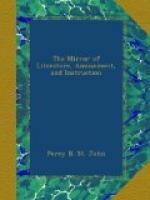This evidence of Pierre remained at the time concealed in the bosoms of the Inquisitors to whom it had been delivered; and no official declarations satisfied public curiosity as to the cause of the sanguinary executions which deformed the Capital. A rumour indeed spread itself abroad, and, although not traced to any certain authority, was universally credited, that a great peril had been escaped; that Venice had trembled on the very brink of destruction; and that the Spaniards had meditated her ruin. Popular fury was accordingly directed against the Marquis de Bedemar; and so fierce were the menaces of summary vengeance that the ambassador was forced to protest his innocence before the Collegio, more in the spirit of one deprecating punishment than defying accusation. He then earnestly solicited protection against the rabble surrounding his palace; for “God knows,” affirmed his pale and affrighted secretary more than once, “the danger of our residence is great!” The Vice-doge, who during the interregnum between the death of one chief magistrate and the election of another presided over the Collegio, replied vaguely, coldly, and formally; and, the application having been renewed without any more favourable result, Bedemar, justly apprehensive for his safety, seized a pretext for withdrawing, till a successor to his embassy was appointed. Meantime, considerable doubts were entertained, not only by the resident foreign ministers,— especially by that of France, better informed than his brethren through the possession of Pierre’s minutes,—but by the Venetian senators themselves, also, whether any conspiracy whatever had really existed. Nevertheless, in spite of these misgivings not obscurely expressed, it was not till the expiration of five months that the X presented a report to the Senate, detailing the information which they had received and the views upon which they had acted. That report however is so manifestly contradicted in many very important instances by Pierre’s depositions, that it must be considered as drawn up and garbled solely with the intention of making a case; and therefore as revealing only so much truth dashed and brewed with a huge proportion of falsehood, as it suited the interests of the magistrates to exhibit to public view. All mention of the denouncements of Pierre during the long period of ten months is carefully suppressed, and yet no fact in history is more distinctly proved than that he did so communicate. The first intimation of the plot is there said to have been given but a few days before it was to have been executed, by two Frenchmen, Montcassin and Balthazar Juven, whom Pierre had endeavoured to seduce. “Look at these Venetians,” said the daring conspirator one day to his apparent proselytes, “they affect to chain the lion; but the lion sometimes devours his master, especially when that master uses him ill.” According to their further evidence, some troops despatched by the Duke d’Ossuna were to land by night on the Piazzetta and to occupy all the strong holds of the city; numerous treasonable agents already within the walls were to master the depots of arms; and fire, rapine, and massacre were to bring the enterprise to consummation.




